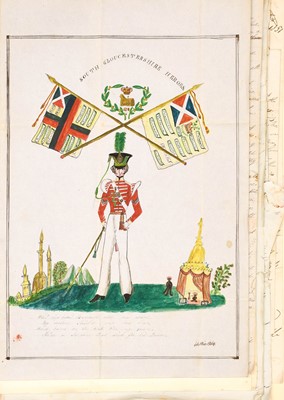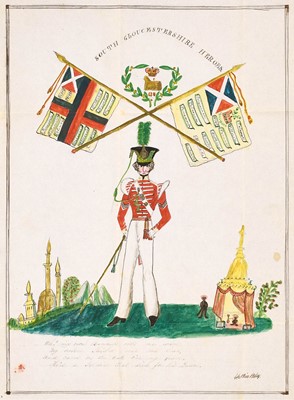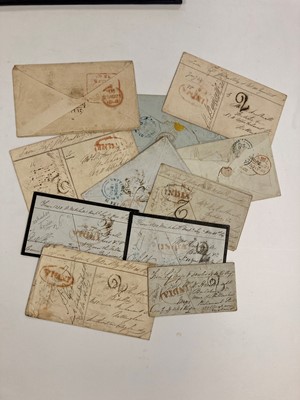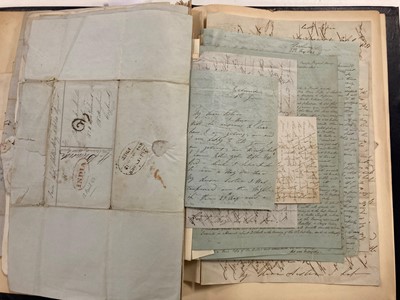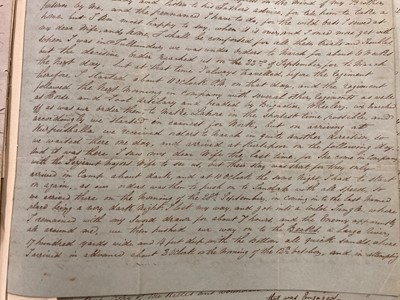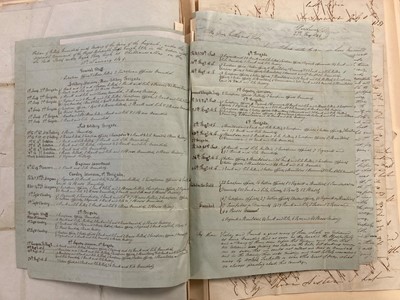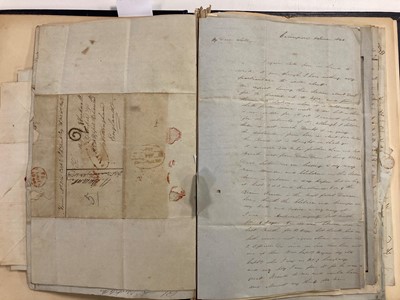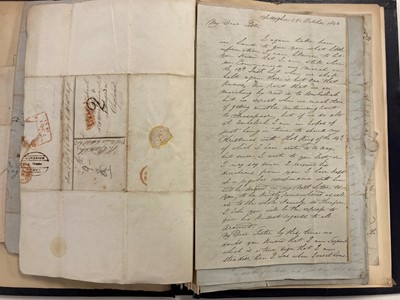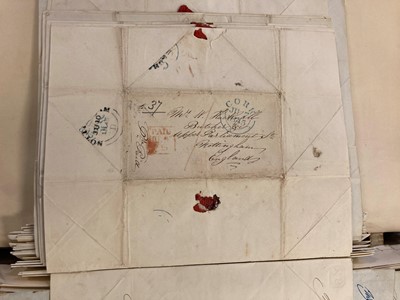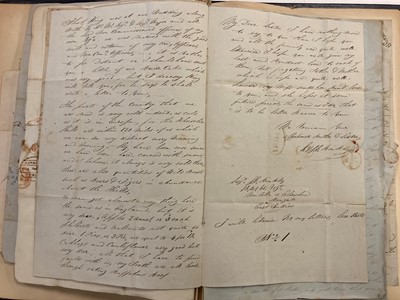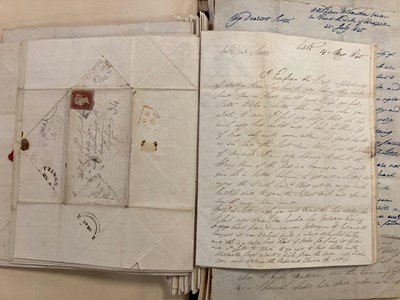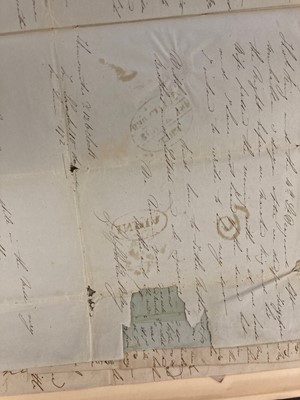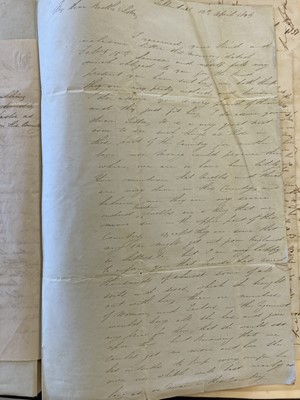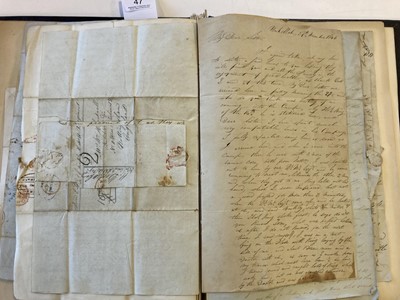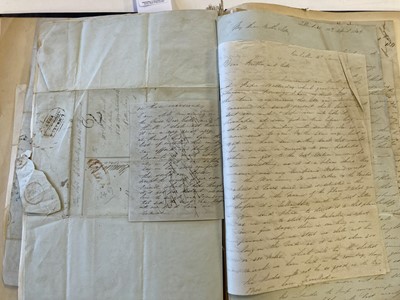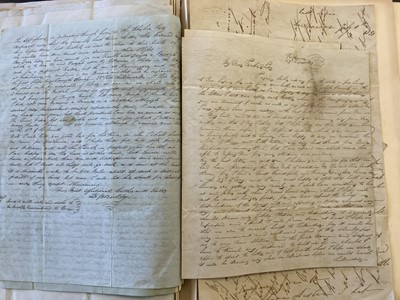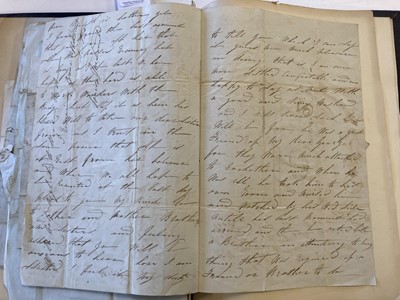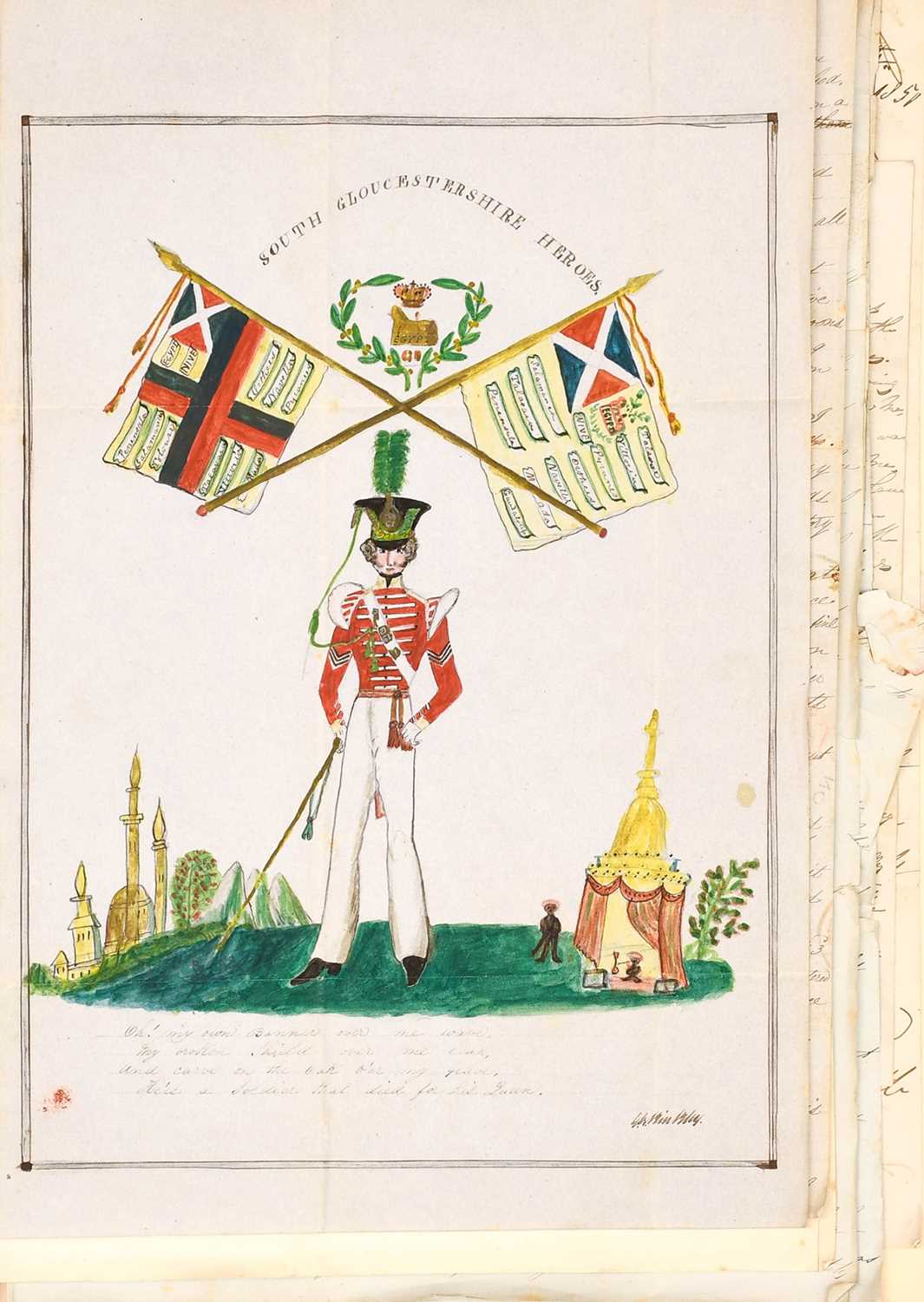13th Dec, 2023 10:30 GMT/BST
Books, Maps & Manuscripts
47
Letters of a British Soldier in Ireland and India (Second Anglo-Sikh War).
Binkley (George C.) [John Curtis], A superb collection of sixty-eight letters written by a soldier of the 61st (South Gloucestershire) Regiment of Foot between 1843 and 1849. Most letters are addressed to his sister in Nottingham and give an interesting and detailed account of life in the army at that time, unusually from an enlisted soldier’s perspective.
Binkley, a Nottingham man, had left work in Birmingham due to illness and in 1843 moved to Cork where poverty drove him to enlist in the 35th Foot. The countryside was ‘in an uproar’ and he witnessed hangings and floggings. Drafted for India, he unsuccessfully tried to persuade doctors that he was unfit for overseas duty. He was transferred to the 61st Foot in 1844 and set sail only to be diverted back to Ireland after 44 days at sea, in 1845 he sailed again from Cork to Calcutta, arriving on October 29th.
On the 622 mile march from Calcutta to Cawnpore, 3 to 4 men died every day, increasing on some days to 8 or 9 men, women or children, most deaths arising from ‘brain fever’ as well as cholera and ‘cramps’. Camels and Elephants carried the baggage. On the way he witnessed an arranged tiger fight which lasted 2 hours until one was killed.
In 1846 he was promoted sergeant and in 1846 was given charge of the Officers’ Mess with 64 black servants under his command. He reports that since arriving in India, the Regiment has lost 242 men, women and children.
In 1847 he married Louisa, the widow of the regimental tailor.
In 1848 he took part in the Second Sikh War, describing a number of battles including Runge Nunle and Marrarah where forts was taken and destroyed and Ramnagar where the enemy ‘proved almost too much for us and in about one hour we lost two of our ammunition wagons and one cannon and about 40-50 of our men killed and wounded’. Moving on to Mukeawall, the British lost about 70-80 killed and wounded.
In February 1849, he wrote of Chillianwallah where, against the Sikhs, ‘we fought the hardest battle that was fought in India and in 3 or 4 hours thousands and thousands lay dead and dying on the fields. The British Army lost 2,357 fighting men, killed and wounded on that day’. The enemy were thought to have lost, killed and wounded, some 26-27 thousand. Darkness prevented retrieval of the dead and wounded ‘and in the morning these were missing and most likely were carried away by wolves, jackals or some other beasts of prey’.
In May 1849, he gave details of the battle of Goojrat, estimating not less than 10 or 12 thousand dead or dying over the part of the field he crossed. He discusses the 14th Light Dragoons who after a very brave charge at Chillianwallah, appeared to have lost their nerve and ‘turned 2 or 3 times but were afraid to retreat on account of some artillery who were behind them and who swore they would fire grape into them if they turned again.’ ‘I have frequently spoken to one or other of them and they all appear to be in the same cry that the Sikhs are too good horse and swordsmen for them. And their swords have an edge as sharp as any razor and the weight of them would take a man’s head off without applying the least weight to it.’
Binkley arrived in Peshawar on the 28th May 1849 where the heat (117*F in the shade) caused many deaths. He received news that his wife had given birth to a daughter but fell ill with a liver abscess and died on December 4th 1849 at the age of 29 having never seen his daughter (who died the following year).
There is also a letter from Binkley’s Sgt. Major advising of his death and four letters from his wife.
Manuscript ink on paper, seventy-two letters:, three one-page, nine two-page, forty-five three-page, thirteen four-page, two five-page.
Eight letters from Birmingham, two franked lettersheets (FL) and six stamped and franked lettersheets (SFL),
Thirty-two letters from Ireland (Cork, Youghall, Templemore, Cashel, Buttervant and Dunmanway), twenty FL, ten SFL, one with franked envelope.
One letter from the Northern Atlantic, on board the Duke of Bedford.
Twenty-six letters from India (Dum Dum, Cawnpore, Tuttyghur, Umbellah, Jullunder, Pershawar), sixteen FL. One letter with original artwork depicting a sergeant under the battle colours of the South Goucestershires, sent after his promotion to sergeant, signed lower corner.
Sgt. Major’s Letter, Peshawar, black edged.
Wife’s letters, one FL.
Eleven India franked envelopes loosely inserted.
Letters stitch-bound on tabs in large folio.
Note: Early letters are signed G. C. Binkley or Geo. C. Binkley, in later letters after October 1846 the first letter of the signature changes, possibly to 'J'. A paper on the letters, titled ‘The Letters of John Curtis Binkley, 1843-1849’ was written by Dr Peter Beattie and appeared in the Journal of the Society for Army Historical Research, Vol 61, No. 245 (Spring 1983). Letters, draft papers and offprints are included with the lot.
Sold for £6,500
Estimated at £700 - £1,000
Generally, letters in VG condition, some opening tears, at least one with a little loss to script (see image), one letter with strip excised but present (see image). A little staining in places, some outer panels of folding letters are dust marked.
We are happy to provide Condition Reports to prospective buyers, but would welcome your request as soon as possible, preferably at least 48 hours before the Day of Sale. We cannot guarantee a reply to any requests made within 48 hours of the start of the auction. The absence of a Condition Report from a lot does not mean that the lot is in perfect condition. A Condition Report is an honest expression of our opinion, not a statement of fact and is provided as a service to the seller. All lots are available on public view ahead of an auction and we encourage prospective buyers to inspect an item in person where possible. Our Condition Reports are not prepared by professional conservators, restorers, or engineers, and are prepared with the naked eye unless otherwise stated.
Regarding Pictures, Prints and Works on Paper, works are not examined out of the frame, unless specifically stated. Tennants Auctioneers do not cover damage to gilded wood or plaster picture frames, or to picture frame glass whilst the item is in our possession.
We accept no liability for the opinions expressed in any Condition Report.
Auction: Books, Maps & Manuscripts, 13th Dec, 2023
The Books, Maps and Manuscripts sales encompass a broad range of collecting areas from early antiquarian books to modern first editions, which are sold alongside illustrations, private press, manuscripts, maps and atlases, early photographs, autographed letters and historic documents. Held four times a year, the specialist Book sales incorporate both private collections and libraries, and single lots from vendors across the United Kingdom.
Viewing
Tuesday 12 December 10am-5pm and morning of sale from 8am
Sell one like this
If you've got a similar item to sell, complete the valuation form below and one of our experts will get in touch.
